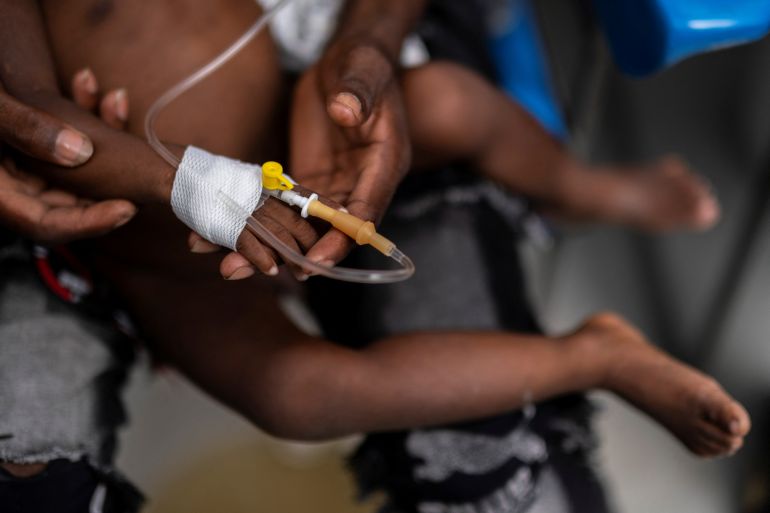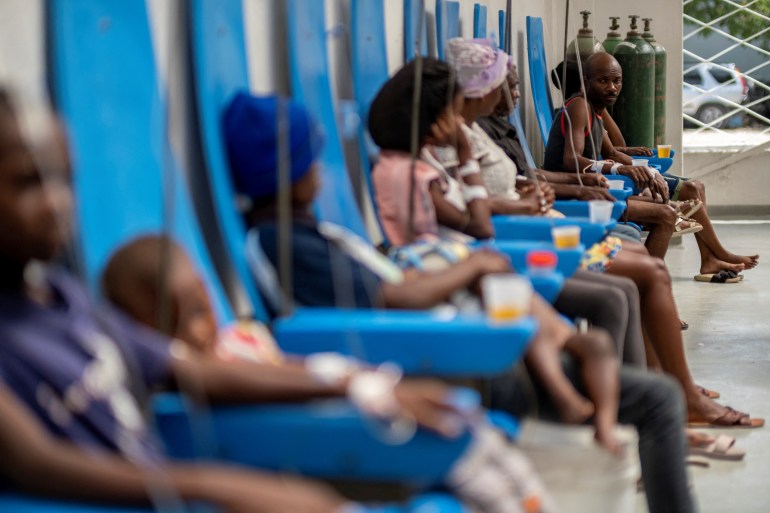Children account for 40 percent of cholera cases in Haiti: UNICEF
UN agency says Haitian children face ‘triple threat’ of malnutrition, cholera and armed violence in crisis-hit nation.

Approximately two in five cholera cases are among children in Haiti, the United Nations children’s agency (UNICEF) said, as the Caribbean nation grapples with a deadly outbreak made worse by widespread violence and instability.
UNICEF said on Wednesday that about 40 percent of confirmed cholera cases have been in children while nine in 10 were reported in parts of the country also hardest hit by malnutrition and hunger.
“In Haiti right now, there is a triple threat to children’s lives – malnutrition, cholera and armed violence. And sometimes all three together,” Manuel Fontaine, director of UNICEF’s office of emergency programmes, said as he concluded a four-day visit to Haiti.
“I was shocked to see many children at risk of dying in the cholera treatment centres. In just a few hours, acute watery diarrhoea and vomiting dehydrate and weaken them so much they may die without timely and adequate treatment. Cholera and malnutrition are a lethal combination, one leading to the other,” Fontaine said in a statement.
Last month, the UN’s World Food Programme (WFP) said nearly half of the Haitian population – a record 4.7 million people – were dealing with “acute hunger”.

Haiti’s response to the hunger and cholera crises has been complicated by increased gang violence, which skyrocketed in the aftermath of President Jovenel Moise’s assassination in Port-au-Prince last year.
A weeks-long gang blockade on a petrol terminal in the capital that began in September led to water and electricity shortages, crippling the Haitian healthcare network and prompting experts to warn that the country faced a “time bomb for cholera”.
Caused by drinking water or eating food contaminated with cholera bacteria, the illness can trigger severe diarrhoea, as well as vomiting, thirst and other symptoms. It also spreads rapidly in areas without adequate sewage treatment or clean drinking water.
While the Haitian authorities regained control of the blockaded Varreux fuel terminal this month – allowing petrol stations to reopen – a spokesman for Haiti’s health ministry warned that it could lead to more cholera cases because people would be able to move around again.
As of Monday, Haiti had reported more than 11,600 suspected cholera cases and 949 confirmed infections since the outbreak began in early October, according to the latest figures (PDF) from the Haitian public health department. At least 202 people have died.
Haiti had last reported a cholera case more than three years ago, after a 2010 outbreak linked to United Nations peacekeepers caused approximately 10,000 deaths and more than 820,000 infections.
That outbreak was tied to a sewage leak from a UN peacekeeping base, spurring condemnation and sowing public distrust in the international body across Haiti. The UN apologised in 2016 for its role in the epidemic.